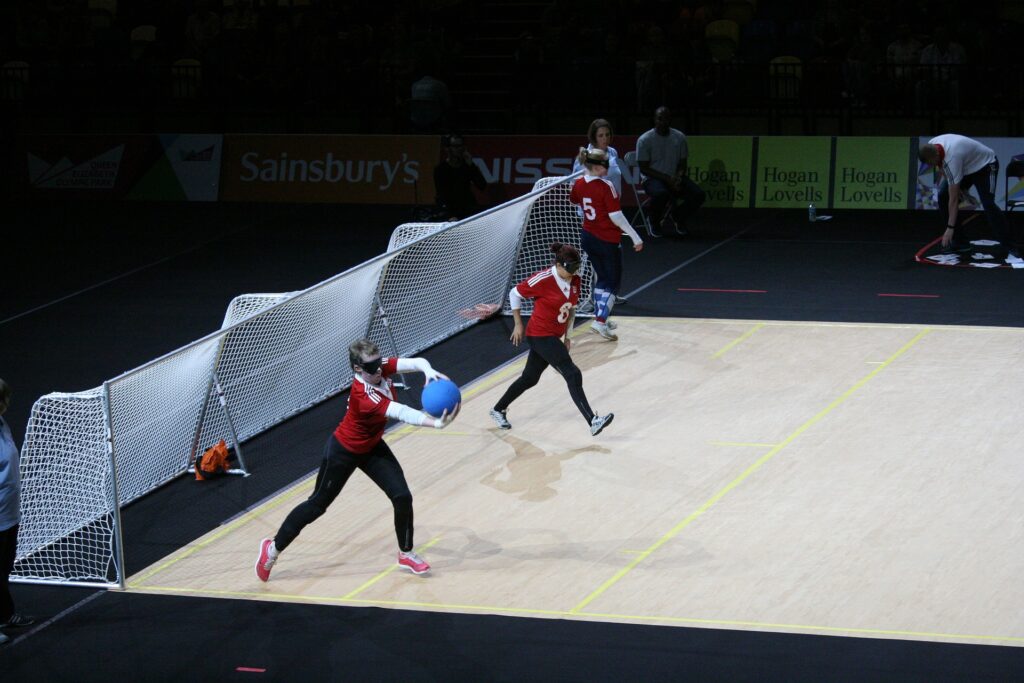
Editor’s note: Goalball, a sport for individuals who are blind or low vision, can be played recreationally and competitively.
When I started college, one of the things I was most upset about leaving behind was my goalball team. I played goalball throughout high school, and it quickly became one of my favorite sports. I not only loved the sport, but I loved the community. I did not want college to be the end of goalball for me, so I decided to bring my passion to my university.
Goalball
Goalball was the first sport I ever played that was made for people who are blind and low vision, by people who were blind and low vision. I was a very active kid, but every time I got on a field or in a pool, adaptations were made to the sport so I could participate. I am grateful for these accommodations; they should be more widely known, but goalball is a sport that was designed for someone who does not have vision.
The eyeshades (blindfolds) in goalball make it so that sighted people have to adapt to being blind, and that makes all the difference. I feel strong when I am on a goalball court. My limited vision is not a hindrance to my ability to play but rather a tool I can use.
The community that came along with playing goalball was also so empowering to me. I grew up in public school, and I am grateful that I could do so, but when I had an opportunity to play goalball for the Kentucky School for the Blind, I couldn’t say no. I would travel to games and be surrounded by other teens who were blind and low vision, just like I was. Seeing that I was not alone was critical to my self-confidence during high school.
Graduating, But Not Leaving Goalball Behind
Graduating marked the end of my eligibility for the regional goalball conference put on by the North Central Association of Schools for the Blind (NCASB), but I knew this did not have to be the end of my time playing goalball. I investigated regional United States Association of Blind Athletes (USABA) teams, but none were viable options for me at the time. This left me with only one avenue: starting goalball at my university.
I was not disillusioned; I knew this would not be an easy task. I was going to have to figure out how to reserve a basketball court, lay the raised lines down on the court so people could play without damaging my university’s property, get enough people interested in playing, and teach all of them how to play since I was the only student at my university who was blind or low vision. But I refused to be deterred. I would try my hardest to make this happen.
Within my first month of being on campus, I got in contact with some other students who were working on starting a club for students with disabilities. Together, we founded a club that provided students with a safe place to learn and fellowship with others living with disabilities. It is still one of my favorite parts of my school.
Before we were officially a club, though, we had to be approved. One of the steps of approval required a proposal for a school-wide event that the club would host at least once a semester. I had found the perfect way to start playing goalball at my university.
Since we were a club, we could reserve the basketball courts so we could play, we had a budget to buy equipment to help lay the court, and we had a loyal group of club members who would come out to play. My college goalball goals were going to be achieved.
Goalball Day
Our club held its first Goalball Day during the Fall 2020 semester, and it was a hit! We had a huge turnout of people who just wanted to learn more about a sport they had never heard of. I was able to teach probably 30 of my sighted peers how to play a sport for the blind.
I loved sharing this part of my culture and educating people on how people who are blind or low vision can still play sports. I loved watching my peers push themselves outside their comfort zone by putting on eyeshades and letting someone roll a ball toward them. The day gave me hope for a future where goalball is as ingrained into our American culture as football or basketball.
Goalball Day has only grown since that first clinic. We play at least twice a semester and are pushing to have goalball as an intermural sport for the university, which would be the first ever.
I have found a way to continue playing the sport I love, and I have found a way to share it with others. I am so grateful for the opportunity to show my school how amazing goalball is. I hope that the legacy of goalball will be able to continue even after I graduate as we move towards making it an official intermural sport. Goalball is so important to the blind/ low vision community, and I know it can help teach the sighted world a little bit about life with blindness or low vision.